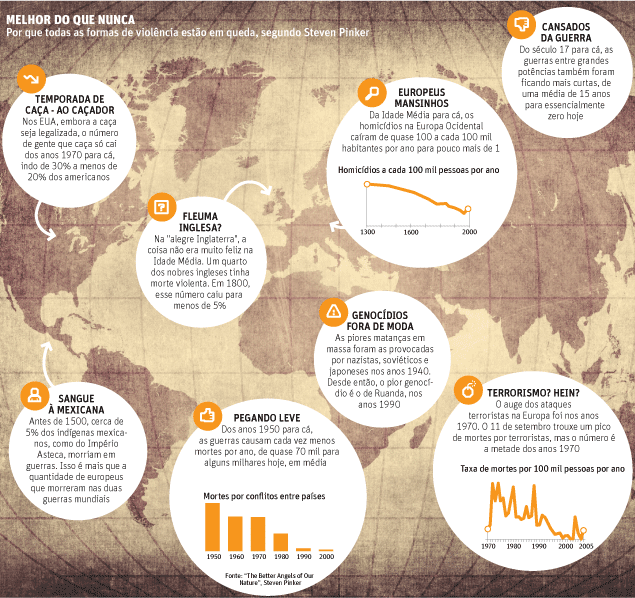http://www1.folha.uol.com.br/ciencia/993687-mundo-nunca-foi-tao-pacifico-diz-cientista-dos-eua.shtmlFaz pelo menos 500 anos que o mundo está se tornando um lugar cada vez mais seguro para se viver, e a raça humana nunca foi tão pouco violenta. Ataques terroristas e guerras civis são meros soluços estatísticos numa paz que nossos ancestrais achariam quase impensável.
Duro de engolir, certo? Pois os números reunidos por Steven Pinker, 57, psicólogo evolucionista da Universidade Harvard, são difíceis de refutar. Todas as formas de violência estão em declínio, das guerras à crueldade com animais, e em alguns casos a queda já dura séculos, diz ele.

Pinker, pop star científico que aprecia os temas polêmicos (ler abaixo), apresenta um resumo de seus argumentos em artigo de opinião na edição de hoje na revista científica "Nature". São ideias tiradas de seu novo livro, "The Better Angels of Our Nature" (ainda sem edição no Brasil).
ANJO BOM Conforme o título do livro sugere, Pinker argumenta que os "anjos bons [literalmente, melhores] da nossa natureza" estão vencendo a disputa pela alma humana.
"As histórias da Antiguidade estão cheias de conquistas gloriosas que hoje seriam classificadas como genocídios. Fulano, o Grande e Sicrano, o Grande seriam processados como criminosos de guerra", brinca o cientista. E não se trata só da Antiguidade.
O registro arqueológico e os estudos sobre povos indígenas atuais mostram que esse negócio de bom selvagem não existe, diz Pinker.
Mais precisamente, esses povos cometem centenas de vezes mais homicídios do que os europeus do século 21, e cerca de 20% das pessoas nessas sociedades morrem em guerras, afirma ele.
O bioantropólogo Walter Neves, especialista da USP que estuda os primeiros habitantes da América, concorda. "A guerra, seja entre caçadores-coletores, seja entre horticultores [agricultores primitivos], é crônica e endêmica", afirma ele. No caso de povos pré-históricos, "é preciso tomar um pouco de cuidado porque a agressão entre eles, como bordoadas, deixa marcas no esqueleto que a nossa muitas vezes não deixa, então é difícil fazer a comparação", diz.
BRAÇO FORTE A primeira queda na pancadaria teria vindo com o fortalecimento dos Estados, em especial as monarquias europeias, a partir do século 16.
Com o rei abarcando o poder absoluto e os nobres (que costumavam guerrear entre si) na coleira, a violência desregrada saiu de cena, já que atrapalhava a centralização de poder e riqueza desejada pelo monarca.
Segundo motivo de queda da violência, segundo Pinker: a invenção da imprensa, barateando a circulação de ideias, e o Iluminismo resultante desse processo.
Os pensadores iluministas, com sua ênfase no debate racional e sua redescoberta das ideias democráticas, dominaram o universo intelectual europeu, debatendo todos os temas tabus e defendendo os direitos de plebeus, minorias, mulheres e até animais.
O debate iluminista acabou levando ao lento porém crescente predomínio da democracia como regime de governo, o que também diminuiu guerras --é muito raro que uma democracia declare guerra contra outra. E o avanço do comércio internacional tornou os países cada vez menos interessados em guerrear por riquezas, diz ele.
NÃO AO SENSO COMUM Steven Pinker tem uma predileção pelos debates politicamente incorretos. Seu livro mais polêmico antes da nova obra sobre a história da violência se chama "Tábula Rasa" e tem como meta mostrar que a natureza humana é algo relativamente difícil de mudar, independente dos esforços de pais, professores ou doutrinadores políticos e religiosos.
A ideia de que existe uma natureza humana vai contra a corrente dominante nas ciências humanas e entre intelectuais de esquerda, para os quais seria possível "melhorar" a humanidade.
Curiosamente, se o novo livro não é uma mea culpa, ao menos mostra certa fé de Pinker no progresso.
"THE BETTER ANGELS OF OUR NATURE"AUTOR Steven Pinker
EDITORA Viking
QUANTO US$ 19,99 (como livro eletrônico no site Amazon)
CLASSIFICAÇÃO ótimo